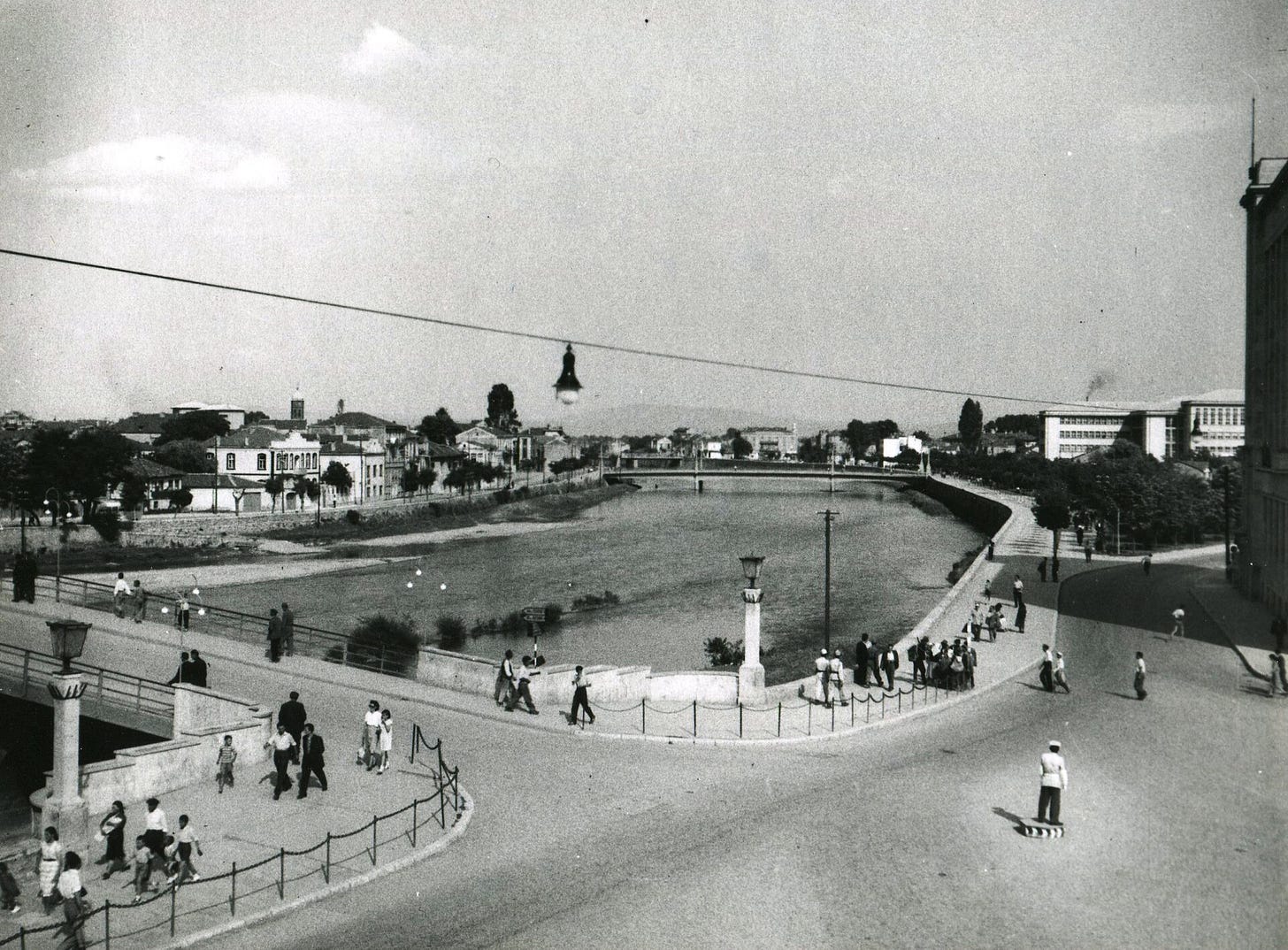How garbage came to the city. And how it will disappear again
#384

Friend of Democracy,
By researching Skopje, the capital of North Macedonia (and the city I've been in since yesterday) I came across this photo from 1950 (see above).
An intersection, a street light, a policeman directing traffic, a bridge, a river (the Vardar).
Somehow, I found the picture so different than my first impression of the city.
It took me a while to notice that something was missing from the picture: garbage.
Many suburbs and cities in the Balkans (and not only there, of course) are full of garbage, especially plastic waste.
This impression stays with me throughout my summer holiday trip through southeastern Europe: When you approach a larger city, nature transforms into garbage dumps — almost everywhere.
This garbage didn't exist 75 years ago. Hence, the tidiness in the picture (another clear difference is the many, many cars today).
Sure, the lack of visible garbage in the picture doesn't mean no environmental problems back then (think of the lack of sewage and drainage systems in cities). However, the ubiquitous plastic waste today is a new phenomenon.
A phenomenon for which many societies haven't yet found an answer.
Here is an economic approach.
In the past, people didn't throw things away because most of them had value. They were kept, returned, and reused.
Today, the value of plastic, especially plastic packaging, is tied to a specific time. Plastic only has value until it has served a particular purpose (for example, protecting a product until it is sold). Once the packaging is torn open and removed, it becomes worthless to the people. From then on, the plastic becomes a nuisance, garbage that we want to get rid of.
The easiest way to get rid of garbage: throw it away. The plastic wrapper that made the cigarette pack look new when sold despite the long transport, the Cola can that kept the drink fresh and clean, the plastic chair that offered guests relaxation in the garden for a long time – all of this ends up on the ground, in the river, in nature.
Many find this unreasonable and harmful.
Many do it anyway.
Why?
There are two answers to this question. Both are interrelated.
One answer is: It is a rational behaviour. People can do it without being punished. It is good for them. But bad for society. A classical dilemma.
Controlling and thus punishing discarded plastic waste is difficult, if not impossible. Anyone who doesn't want a total surveillance state has to live with the fact that the gum wrapper is carelessly dropped on the ground after it has served its purpose. Where no punishment exists, what one shouldn't do is still done, with particular frequency.
The second answer of why there are so many litter-filled cities: Because we haven't yet developed sufficient shame.
Shame arises when we violate social, moral, or personal norms. Clothing, hygiene, professional failure, deviation from sexual norms, sexual assault – the list of things people are ashamed of is long.
The crucial point here is: Shame is socially learned, not innate. And: Educating people to be ashamed is particularly important where external surveillance and control don't work.
For example, because the area is private (which is probably one of the reasons why shame is so high for sexual abuse).
Shame complements the law. It always has.
Back to the plastic problem.
Because surveillance is only partially possible, a sense of shame is needed to get the plastic problem under control. Anyone who throws away plastic (and doesn't dispose of it correctly) should have at least one thing: a guilty conscience.
The more people feel this way, the more beautiful cities will become (again).
Is that positive outlook realistic?
There is another problem: usually feelings of shame develop over generations. But the plastic problem didn't just arise in a short period. It also needs to be solved quickly.
A way out of this dilemma: We need to make a significant effort to raise awareness of the problems of plastic waste. What are the consequences? Who suffers? What can be done?
These questions must be brought to the forefront of society—in daycare centres, schools, the media, public spaces. Those who throw away plastic should no longer be able to think that this is the majority behaviour. Instead, they should feel that most people find it quite bad. This would create shame — the good kind of shame— the kind that holds societies together.
See you in Democracy,
Johannes Eber

